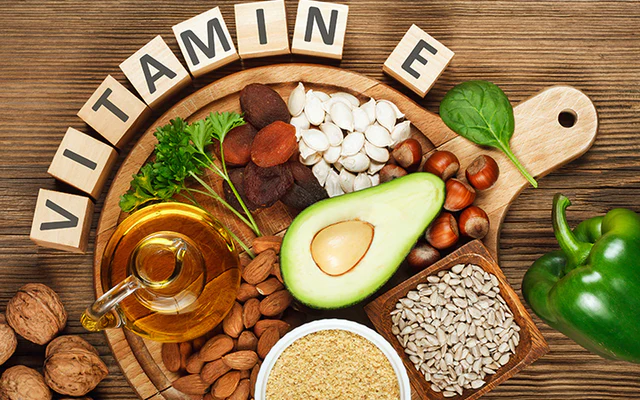
Key facts
- Vitamin E is the name given to a group of vitamins found in a wide variety of oily foods.
- Vitamin E helps maintain a healthy immune system, healthy vision and skin.
- Vitamin E deficiency is uncommon since you only need to consume a small amount in your diet to stay healthy.
- High-dose vitamin E supplements can build up in your body and this can be harmful.
What is vitamin E?
Vitamin E is the name given to a group of 8 vitamins. It is also known as tocopherol. The most important role of vitamin E is as an antioxidant to remove free radicals, which are chemicals that damage the body’s cells.
Why is vitamin E important for my health?
As an antioxidant, vitamin E helps protect your body against damage caused by exposure to harmful substances in the environment such as cigarette smoke and radiation. Vitamin E also plays a role in keeping your immune system healthy, as well as promoting healthy vision and skin.
Vitamin E may also have a role to play in maintaining heart health.
Many studies have investigated the role of a diet rich in vitamin E for the prevention of a range of cancers. There is, however, no conclusive evidence that having a high dietary intake or adding vitamin E supplements to your diet will reduce your likelihood of getting cancer.
Vitamin E — in combination with vitamin C, beta carotene and zinc — has been shown to provide some protection against the eye disease AMD (age-related macular degeneration) in people who are at high risk of developing the condition. Vitamin E alone will not, however, reduce this risk.
What are some good natural sources of vitamin E?
Vitamin E is found in animal products, vegetables and seeds that contain fats and oils. You can get vitamin E by including meat products, nuts and seeds, healthy oils (such as avocado) or unprocessed cereals and wholegrains in your diet.
Read more about foods high in vitamin E.
Should I take vitamin E supplements?
The best way to give your body the vitamins it needs is to eat a varied diet that includes healthy proteins (such as lean meats and poultry, fish, eggs, dairy, nuts, seeds, legumes and beans) and a variety of fresh fruit and vegetables.
Taking a single vitamin E supplement will increase the amount of that specific vitamin in your body but won’t necessarily mean you’re getting the nutrients, minerals, vitamins and dietary fibre that come with a balanced diet.
Eating whole foods is a healthier approach.
If you are on a restrictive diet, such as a vegan diet, or you have a health condition that impacts how you eat foods or how you absorb nutrients, you may need to take vitamin supplements to avoid deficiency and stay healthy.
Before taking any vitamin supplement — and particularly if you are on a restrictive diet — speak with your doctor or an accredited dietitian.
What is the recommended dosage for vitamin E?
The adequate intake (AI) set by the Australian Government varies, depending on your life stage and your sex. The AI for vitamin E ranges from 4mg daily for infants 0-6 months of age, to 10mg daily for men and 7mg daily for women. If you are pregnant or breastfeeding, consult a dietitian for specific nutrition advice.
Can I take too much vitamin E?
There is no evidence of major harmful effects from vitamin E consumed naturally through foods.
Having too much vitamin E in your body is generally caused by taking supplements at levels beyond the recommended doses. This can sometimes happen if you take a multivitamin (with vitamin E) together with another vitamin E supplement.
Australian guidelines recommend that men and women should have no more than 300mg of vitamin E each day.

